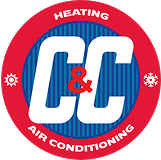It’s likely that you’ve come across the term “BTU” when looking into the possibility of getting a new air conditioner. BTU is a way of telling us how powerful a particular unit is. As you’d expect, having more BTUs means that an appliance is more powerful. You might initially think that having more power is always going to be the optimal situation, but it’s not quite as simple as that. This overview will go over what BTU means and how you can determine how many BTUs are ideal for your residence. This way, you’ll be able to stay cool and comfortable through the summer.
The Definition of BTU
BTU stands for British thermal unit. In other words, it’s a unit of heat. Specifically, it’s the amount of heat, or energy, necessary to increase the temperature of 1 pound of water by 1 degree Fahrenheit. Given its name, it’s not a surprise that the term was made popular in Britain. In the 1800s, British scientists started using it as a standard measurement. Today, our HVAC industry uses it to standardize how we describe air conditioners and other major appliances. In terms of air conditioners, it’s used to tell us how quickly an AC unit can remove heat from a home.
How Many BTUs Are Optimal?
A single BTU is a relatively small amount. Just think of how powerful and efficient our microwaves can be when heating a small amount of water. The recommendation for air conditioning is that one BTU should be used to cool anywhere from about 20 to 60 square feet.
When cooling a room in a house, we typically have to cool spaces that could be 300 square feet, 400 square feet, or 700 square feet. For a 300-square-foot area, an AC unit with approximately 7,000 BTUs would likely get the job done. A 9,000-BTU unit could cool a 400-square-foot space while a 14,000-BTU AC unit could effectively cool a 700-square-foot room.
Keep in mind, though, that these are just general guidelines. There are many important factors to consider when determining the ideal amount of BTUs for a cooling unit, including:
- Amount of shade
- Humidity level
- What floor the room is on
- How many people will be in the space
- Number of windows
- Height of ceilings
As you can see, it can be a complex process to calculate what size air conditioner you need. That’s why it’s a good idea to have a professional come out and assess your home.
Problems With Too Many or Too Few BTUs
It’s important to get the BTUs right if you want to get the most out of your investment in your air conditioner. If you have too many BTUs, your unit will get its work done quickly. By itself, this isn’t necessarily bad, but it creates a potentially harmful cycle. Once the AC unit cools the space to the desired temperature, it would turn off. As the room heats up again, the unit would turn back on again, and so on. This is called short-cycling, and it can lead to problems. Turning on and off again so frequently can overwork the compressor and potentially shorten the lifespan of the air conditioner. In addition, a unit with more BTUs is likely going to be more expensive than one with fewer BTUs, so you’d be spending more money than would be recommended.
If your unit isn’t powerful enough, it will run continuously in a struggle to cool your house. This can shorten its lifespan and cause certain components to wear down prematurely. Another downfall is that you might not be comfortable since your unit will not ever get your place to your desired temperature. Plus, running your system constantly may increase your monthly utility bills.
BTUs and Tons
Whole-home air conditioners are different than portable or window AC units. They’re much more powerful, and usually, they’re connected to central air duct systems. There are other air conditioners that are ductless, and these would be optimal for houses that don’t have existing ductwork.
When describing whole-house air conditioners, we usually refer to their size by using tons. Not to worry — we’re not talking about the actual weight of an air conditioner. Otherwise, it would seem impossible for a 4-ton AC unit to be accommodated inside a typical home.
A 1-ton unit has approximately 12,000 BTUs. A 2-ton unit has about 24,000 BTUs, and so on. The math behind this is interesting. Before modern air conditioning, people would use huge blocks of ice to cool down their homes. The ice would absorb heat, much like a modern air conditioner removes heat from the air. It was determined that one ton of ice could remove 288,000 BTUs of heat from a building over the course of a day. Dividing that amount by 24 hours gives you 12,000 BTUs.
In our area, where it does get pretty hot in the summer, it may be recommended that a smaller house uses a 2-ton unit. An air conditioner of this size would likely do a good job of cooling a home that’s less than 1,400 square feet. A house that’s about 2,000 square feet would likely need a 3-ton unit. A larger property would need a 4-ton or 5-ton unit to keep everyone nice and comfortable.
An alternative would be to split a home into different zones and get separate AC units for each zone. If one area of the house is used mostly during the day, for example, and the other area is used at night, this would make a lot of sense.
Again, though, remember that many factors influence cooling. If you have a newly constructed home with energy-efficient windows and a lot of insulation, you may not need as large of an air conditioner. On the other hand, an older house with high ceilings and drafts may need something more powerful.
Efficiency Ratings
A final thought is in regards to the SEER rating of an AC unit. SEER stands for seasonal energy efficiency ratio, and it tells you how much energy an air conditioner uses. This shouldn’t be confused with how much energy (BTUs), or heat, an AC unit can remove from an area. You’d still want to look first at BTUs, and then you could determine which models you prefer based on their energy usage.
An AC Company You Can Trust
At C & C Heating and Air Conditioning, we’ve been in business since 1948. We’re proud to have helped so many of our neighbors in the Roseville area with AC installations. We also provide services related to repairs and maintenance, and they aren’t limited to cooling units. We specialize in heating services as well, and we can assist you with everything from ductless appliances and water heaters to air filtration equipment and furnaces. If you’re interested, we have maintenance plans available that could end up saving you money in the long run. Give us a call today for more information or to schedule a consultation.





